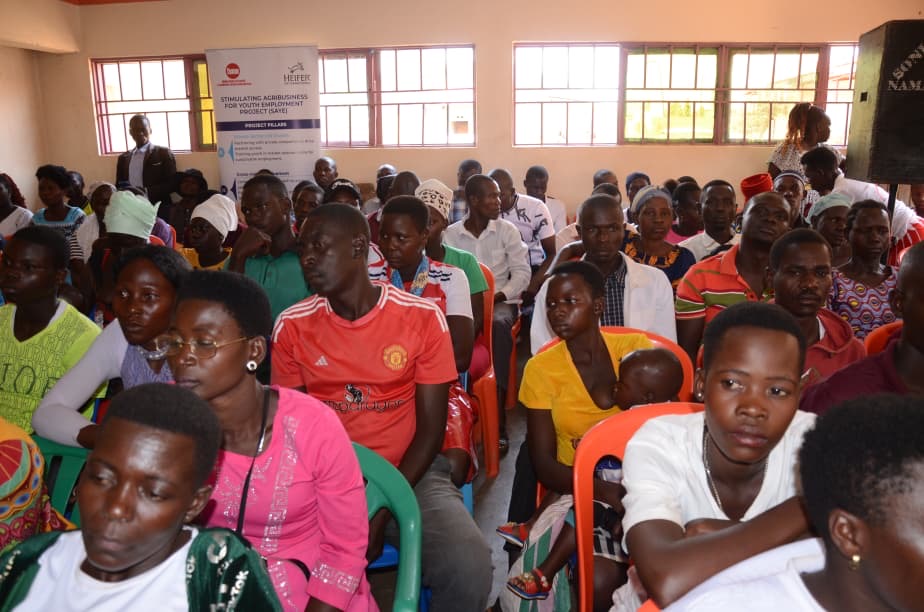Namayingo: In the heart of Busoga Sub-region, where youth unemployment remains a pressing challenge, a new wave of optimism is taking shape. The Federation of Small and Medium-Sized Enterprises (FSME) Uganda, through the Strengthening Agribusiness Youth Enterprises (SAYE) Project, has stepped up efforts to empower young people with practical skills, access to markets, and policy awareness.
On Friday September 5, 2025, FSME officials convened a youth policy dialogue in Namayingo District, drawing dozens of young entrepreneurs, local leaders, and government stakeholders into conversations aimed at bridging the gaps between youth potential and government support systems.
Mr. Emmanuel Abibi, FSME’s Policy, Grouping and Marketing Officer, explained that the policy dialogue follows a survey conducted in September last year. The survey, he said, was designed to map out the level of support young people in Busoga receive under local government structures.
“We had several findings from that survey,” Emmanuel noted. “Today we wanted to share those findings with the youth and engage them further. The goal is to help them understand that, beyond this project, they can benefit from policies and government-aided programs.”
The engagement is part of a broader FSME strategy to improve the economic and social resilience of young people in 11 districts across Busoga. Under the SAYE Project, which targets 250,000 youth, FSME is tasked to directly reach 62,000 entrepreneurs. In Namayingo alone, at least 500 young people are expected to benefit, particularly those in agribusiness value chains like poultry, horticulture, beef, and oil seeds.
While the project offers promise, young people in Namayingo continue to face daunting challenges. Ms. Sarah Kibenge Kabasinguzi, who addressed the dialogue, painted a picture of daily struggles that hinder youth-led businesses from thriving.
She cited limited access to capital, poor financial literacy, lack of business skills, and inadequate market opportunities as recurring setbacks. The region’s poor road network and security concerns often delay products from reaching markets, while small-scale operators struggle under the weight of heavy taxation.
“Some youth have money but lack the knowledge of how to use it,” Sarah said. “Others don’t keep records or have no clear idea about the businesses they are running. Corruption and poor monitoring make it worse, as many young people fail to benefit from programs like the Parish Development Model (PDM) or Emyooga.”
Sarah urged young people to embrace training opportunities and to approach business with discipline, good customer care, and a positive mindset. She also called on government to improve monitoring mechanisms and road infrastructure, as well as to sensitize youth on the requirements of public programs before disbursing funds.
The dialogue also brought reassuring news on the financing front. Mr. Odako Zadok, the Commercial Officer of Mayuge District, announced that FSME has partnered with other development actors, including Sigma, to inject funds into youth enterprises.
He revealed that over UGX 350 million is in the pipeline, earmarked for agribusiness enterprises in poultry and horticulture. SACCOs will serve as conduits for disbursing funds to young entrepreneurs.
“Preparations are underway. FSME is preparing to support horticulture and poultry enterprises, while ASIGMA is organizing how money will flow through SACCOs to the youth,” Odaku explained.
He encouraged youth to remain committed, cooperative, and passionate about the project:
“Love the project, work with the team, and you will see the results.”
For decades, Busoga has struggled with high rates of youth unemployment, poverty, and underutilization of government programs. Initiatives like the SAYE Project are seen as crucial interventions to change that narrative. By targeting young people not only as beneficiaries but also as active participants in agribusiness value chains, FSME hopes to build a generation of self-reliant and resilient entrepreneurs.
As Abibi concluded, the project is not just about short-term relief but about long-term transformation:
“We are here to improve the social and economic well-being of young people, to help them create their own businesses, and to ensure they benefit from existing government programs. This is about resilience and sustainability.”




